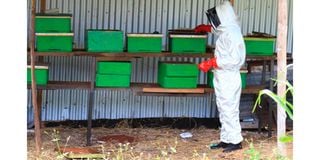Premium
For good urban beekeeping, keep apiary away from people

Bernard Kiruthu inspects bees in an apiary at Kamakwa in Nyeri County on March 15, 2021.
Urban beekeeping is common in developed countries as it gives aspiring bee farmers an opportunity to carry out the business, says Joel Naibei, an apiculture expert from Egerton University.
However, for effective urban beekeeping, he says, farmers should build the apiary on a raised ground.
“Beehive structures should be placed at the roof of a building if possible, better if it is storey, so that they do not interfere with people on the ground.”
He says that apiaries placed on the ground in residential areas may interfere with the neighbours when disturbed during honey collection.
Before starting such an enterprise, Naibei advises that one should ensure that:
a) There is availability of flowers in the neighbourhood since bees can travel up to a three- kilometre radius in search of nectar if there are no trees, flowers or shrubs around. By growing flowering plants that depend on pollination, one will save the bees from the long journey of searching for nectar.
b) Check on the security. The apiary should be set up at a place that leaves a 150-metre radius from the neighbour’s house or yours. You could be rearing livestock, so the structure should be far away from your house.
c) The insects have enough water.
Before venturing into the enterprise, he notes that a farmer should hire an expert who will ensure that all the required conditions are met. He would also help in siting the apiary.
Currently, Kenya has not diagnosed any bee diseases unlike the western countries, says Naibei. The diseases could be there locally, but we haven’t seen them affecting the bees thus research should be done on the subject.
According to the lecturer, in spite of bees being classified under the entomology department in Kenya, bee diseases are treated by the Veterinary specialists.
So what are the pros and cons of urban beekeeping?
“Urban beekeeping has given farmers with no space an opportunity to venture into the business,” he says, noting the demerits may come due to the risks if one makes mistakes, for instance, putting the hives closer to people.





